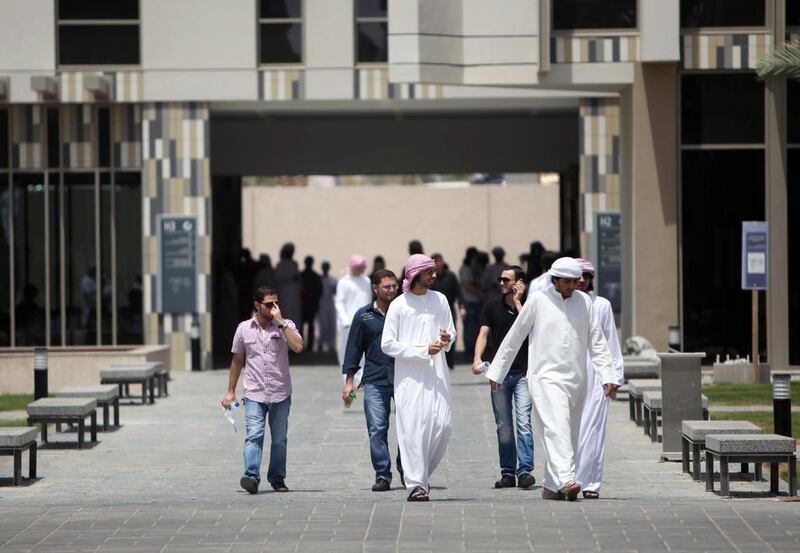ABU DHABI // A proposed university ranking system for the Middle East and North Africa has sparked debate among academics.
Times Higher Education’s World University Rankings is one of the most prestigious systems, but only a handful of Mena universities have gone near the top 400 and none were from GCC countries.
Academics this week gathered at a meeting organised by UAE University and Times Higher Education to discuss how a Mena system should work.
There was debate on how to design rankings acknowledging the still evolving higher education system in the region while using international standards.
Phil Baty, head of Times rankings, said it was difficult to rate Mena universities using the same criteria as World Rankings, which includes institutions such as Harvard, Oxford and Cambridge.
“Rankings have this extraordinary power, not only in institutions bringing data together and giving performance benchmarks, but giving visibility to an institution, helping to govern strategy, helping to promote healthy competition and collaboration,” Mr Baty said. “It’s become a huge tool for students’ decision-making.”
He said the UAE had begun collecting data in the past two years through the Centre For Higher Education Data and Statistics, but collation elsewhere in the region was non-existent.
Data on each university could also be a challenge and verification would be heavily based self reporting and “on trust”.
In Mena, only universities in Turkey, Morocco and Israel are among the world’s top 400.
The goal is to have the new rankings system in place within a year but, Mr Baty said: “We will not produce this until we are sure it works for the community we are serving.”
The rankings usually rate areas such as research, reputation and PhDs awarded, but many of the UAE’s institutions are for teaching only.
Many have no postgraduate programmes, and not all of them even require their teaching staff to have PhDs, because they are teaching only at undergraduate level.
Universities in the UAE do not insist on research output from staff as many leading institutions do.
“The main purpose of many of the higher education institutions in the region is teaching,” said Prof Badr Aboulela, head of the Commission for Academic Accreditation at the Ministry of Higher Education.
“Research is coming up increasingly now, but teaching and learning in my opinion should carry a higher weighting than what is included right now in the three or four ranking systems worldwide, at least for the region,” Prof Aboulela said.
Prof Tod Laursen, president of Khalifa University in Abu Dhabi, warned that the project must be conducted carefully.
“One of the things that’s concerning me a little is that very quickly we’re getting an abundance of these rankings, such as the US News last week, and there is potential for confusion,” Prof Laursen said.
“It’s a little apples and oranges. Institutions in the UAE clearly don’t have the same goals. Some have graduate and research programmes and others are limited to undergraduate education.”
He said ratings also looked at citations of research and much of the Islamic studies research would be published in Arabic, so it would not be measured on such rankings.
“Personally, I’m not sure we can use the same methodology to categorise all these institutions, so maybe we need to differentiate classifications of institution and maybe the methodology doesn’t need to be the same for every institution,” Prof Laursen said.
He said basing the system on world rankings was challenging. “What works in 300-year-old institutions may not be applicable here.”
Despite the complications, some academics welcomed a regional system. Prof Mohamed Albaili, provost of UAE University, said there was increasing demand for it.
“Common characteristics and interests of the region’s universities” would mean a Mena-specific system would make sense.
“We need to compare our performance with our neighbours,” Prof Albaili said. “It’s very important to share knowledge and expertise and, of course, information when it comes to research. ”
mswan@thenational.ae






